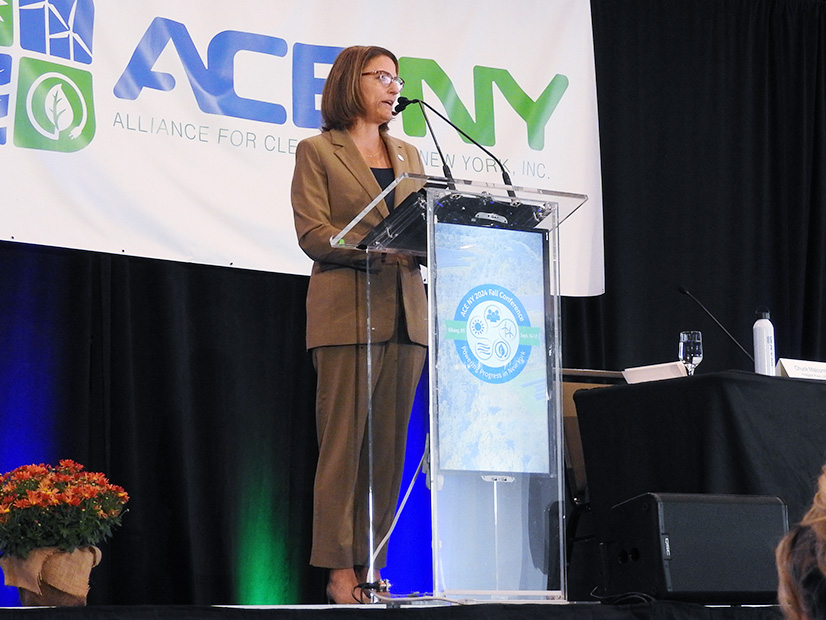
A city bus trundled to a halt on a dusty gravel road just south of Albany at the Port of Albany’s offshore wind expansion project. The passengers, various representatives from labor, the energy industry and the Alliance for Clean Energy New York, shielded their eyes from the late afternoon sun, staring across several acres of flat, riverside land.
“If you look out to the east side, you’ll see a line of trees that stretches about eight acres,” said Richard Hendrick, CEO of the Port of Albany. “We engaged early on with the First Nations people who have sacred land on the east side of the Hudson River. … They suggested if we just keep that buffer of trees, none of what we’re doing here will impact their view.”
Hendrick and his staff proudly showed off the newly created, fully permitted site they hope will be the center of offshore wind tower manufacturing for New York’s emerging market. Hendrick’s team had removed 30,000 tons of contaminated coal ash from roughly 100 acres of land and capped off the rest of the soil. Construction is entering final stages on a 400-foot steel bridge to connect the site to the rest of the port over a nearby creek.
Construction on a 500-foot wharf and dedicated substation are due to begin in early 2025.
Optimistic Outlook
The tour, forward looking and full of hope, put a period on the general theme of the Alliance for Clean Energy NY’s fall conference. Industry players, regulators and elected officials generally were positive about the direction of New York’s energy future despite recent reporting that the state would fall short of its 2030 climate goals.
“Our pipeline continues to grow,” said Doreen Harris, president of NYSERDA, in her breakfast keynote address. “We have over 100 large-scale renewable projects in the interconnection queue. … These projects are getting built! Some of you may know that I’ve coined that summer of 2024 is the ‘Summer of Shovels,’ and you have kept me very busy celebrating.”
Harris said that just 10 years ago, the renewable picture wasn’t nearly as robust. She pointed to 1 GW of distributed solar installed last year and compared it to the roughly 50 MW the state was installing a decade ago.
“If you take nothing else from these remarks, I want you to know that the renewable energy pie will continue to grow here in New York in the coming decades,” Harris said. She said her goal is to accelerate the progress on renewables, and she encouraged industry representatives to participate in developing the new Clean Energy Standard.
“The phoenix has risen from the ashes here in New York, and we have collectively emerged stronger, smarter, wiser and more powerful,” she said. “Make no mistake: This was a Herculean effort. But here in New York, we deliver on our promises.”
Speeding up progress on siting, permitting and interconnection was the major theme of the morning’s panel discussions. Department of Environmental Conservation interim Commissioner Sean Mahar told attendees he didn’t want the DEC to be a barrier to renewable development.
“What we think we’re doing right now is creating a more workable program,” Mahar said, referencing wetland regulations. “We are structuring this program in the right way so as not to be a barrier to development, but to make sure development is happening in the right places.”
In later comments, Mahar said DEC is working on ways to permit renewable energy development on brownfields and Superfund sites, to streamline the permitting process and to streamline mitigation efforts in places where renewables harm the environment.
Zach Smith, vice president of system and resource planning for NYISO, said the ISO implemented a new interconnection process to speed up the expansion of transmission and renewables.
“Our projection is that roughly three times the amount of generating capacity is needed in the next 20 years relative to today’s system. Opportunities abound,” Smith said. “What that capacity looks like, that’s kind of a big question mark. There is not a single formula to this.”
Smith said the upcoming Reliability Needs Assessment was conservative in its estimate of how much generation capacity would be interconnected. Some projects in the interconnection queue weren’t considered as part of the assessment because they weren’t far enough along. He said a finding of a reliability need wasn’t necessarily “pulling the fire alarm.”
“Rather, it’s to flag the need for continued progress on resources in New York State, and we have had many,” Smith said. “It’s an opportunity for further resource development.”
Endorsements for New York’s Renewable Market and Kamala Harris
A lunch panel of renewable energy industry leaders said they were broadly optimistic about building new energy resources in New York.
“The main point here is that you have a very strong market signal about demand in New York, which makes it an attractive place to really think about a multiyearlong investment program,” said Ben Koffel, chief commercial officer of Vineyard Offshore. He pointed to the high forecast load growth for the state. “If you were at this kind of conference a decade ago, people weren’t talking about that. Everyone was talking about energy efficiency.”
He said load growth in New York, combined with the state’s willingness to “put its neck out there and be a leader,” made the state attractive to energy investors.
“We don’t see a tremendous amount of opportunity cost because New York is such a leader, particularly in the offshore space,” Koffel said. “This is a marquee market globally. That’s what we hear from our peers in Europe.”
Mark Richardson, CEO of US Light Energy, a distributed solar energy company, was less enthusiastic about the near term for his industry segment in the state.
“Where the rubber hits the road in terms of deployment, distributed generation has been incredibly successful over the past several years,” Richardson said. “From our perspective, the opportunity in that segment has slowed down dramatically, and it’s a combination of infrastructure capacity, interconnection capacity, interconnection queues … combined with a local stranglehold on the permitting process for smaller projects.”
Richardson said New York, so far, has done a good job, but the distributed generation segment needs more help from the state to deal with local siting and permitting issues.
Clint Plummer, CEO of Rise Light and Power, said the industry had to find ways to get as much community support as it could while also designing projects that would be minimally impactful.
“People don’t want big things in their backyards,” Plummer said. “As a resident, I like that my voice has some impact on what can be built in my community where I live, and as a developer, it’s a major source of annoyance. But it’s a necessity.”
Plummer said this meant going to public meetings and being willing to take the “endless barrage of criticism” that they bring, then adapting plans to mitigate, or avoid, impacts.
“You’re never going to win everybody, but people will respect you for being a trustworthy partner,” Plummer said.
Later, during a “lightning round” question, the topic of the election was brought up to the panel.
“I hope a year from now, Doreen is not the only President Harris that we know,” Plummer said. “But practically speaking, this underscores why New York is a good place to be investing.”
Plummer explained that a Harris presidency probably would be more pro-renewable than a second Trump administration. But if Trump were elected, New York’s position of pushing for more renewable generation for the state still would make it an attractive spot to develop.
Koffel said that even if Trump wins, New York has a strong economic case for renewables now that the industry had gotten to its current size.
“Renewables is a big tent, and the industry touches a lot of people,” Koffel said. “In the event that Trump is the president again, that tent will mobilize to talk about the benefits it’s bringing to the region, the billions and billions of dollars of investment.”



